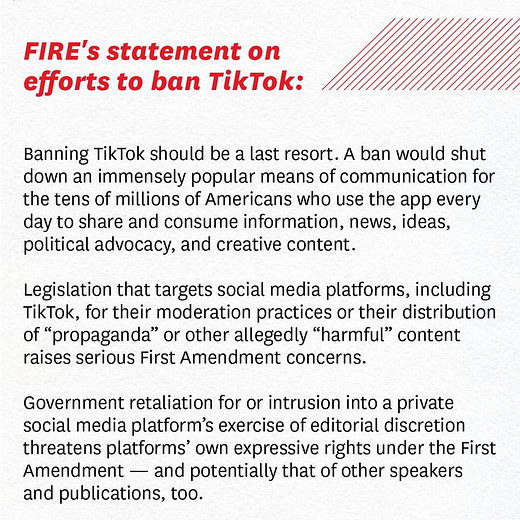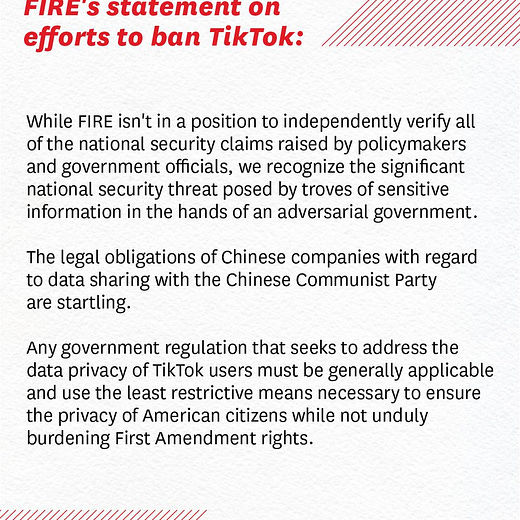E-Pluribus | March 28, 2023
How language is corrupted in the culture wars, people need to grow up, and what the Stanford incident says about DEI ideology.
A round-up of the latest and best writing and musings on the rise of illiberalism in the public discourse:
Andrew Sullivan: Culture War Politics And The English Language
There’s no question that language evolves, but Andrew Sullivan says that some of that is not evolution at all but rather change by design. When there is a shift in the vocabulary of politicians and activists in particular, wisdom says there’s more to it than meets the eye.
It was during the war in Iraq that Orwell’s insistence on clear language first came roaring back. This time, the newspeak was coming from the neocon right. We heard the term “enhanced interrogation techniques” to describe what any sane person would instantly call “torture.” Or “extraordinary rendition” — which meant kidnapping in order to torture. There was “environmental manipulation” — freezing naked human beings to near-death and back again. All the terms followed Orwell’s rules for new words “needed if one wants to name things without calling up mental pictures of them.” All the new terms were opaque and longer than the original.
And then, in the era of “social justice,” the new words began to come from the far left. Words we thought we knew — “queer” for example — were suddenly re-purposed without notice. Gay men and lesbians, with our very distinct experiences, were merged into a non-word, along with transgender people: “LGBT.” That was turned into “LGBTQIA+” — an ever-expanding acronymic abstraction that, in Orwell’s words, “falls upon the facts like soft snow, blurring the outlines and covering up all the details.”
Orwell’s insight was that these terms are designed to describe things you want to obscure. Hence one of his rules: “Never use a foreign phrase, a scientific word or a jargon word if you can think of an everyday English equivalent.” Writing the English that people speak every day is essential for a flourishing democracy.
Read it all here.
Jonah Goldberg: Man Up
From the beginning, humans have been blame-shifters, showing a desire to be the heroes in their own stories (see Adam, Eve, Cain, et al.). At The Dispatch, Jonah Goldberg writes that we’re experiencing an epidemic of childishness, and it’s time for both sides to put away childish things.
Consider the American Library Association, which is once again trotting out its “Banned Book Week” propaganda. Virtually no books in America are banned. Nearly all of the “banned” books the ALA fights for are books that somebody complained about as being inappropriate for kids. “Challenging” a book is not some Orwellian prosecution of thought crimes. The whole enterprise is a marketing scheme—everyone loves to think they’re being a rebel when they buy a “banned book” during “Banned Book Week” at Barnes & Noble. Search Amazon.com—hardly a hidden den of samizdat peddlers—for “Banned Book Week” and you’ll find all manner of T-shirts celebrating your rebelliousness. You can even go to the “Banned Books” section of the largest bookseller in the world.
Now, I have no problem with librarians saying, “Hey, we’re librarians and we should decide what we offer because that’s our job.” (I also have no problem with parents and teachers and school boards saying, “It’s our job too” and having an argument.) But librarians, in their highly cultivated sense of being heroic rebels against the imagined forces of elite conformity, can’t own their own roles. They have to pretend that they’re persecuted and underappreciated outsiders fighting the forces of darkness. Get over yourselves.
[ . . . ]
It is a hallmark of youth to think that the “system” is keeping you down; that you can’t be your authentic self because the Man is out to get you. Your ideals make you a rebel and you don’t want to sell out. But another word for a lot of youthful thinking is “childishness.” And I can be forgiving of childishness in children.
The problem we have today is that we’ve reified, institutionalized, and monetized childishness. The loudest voices on the right and left have convinced themselves and their constituencies that the system is run by somebody else. Every Republican has to insist they will “take on the establishment.” Fine, that’s politics. Dumb politics, but probably necessary politics. But once in power, they don’t say, “I’m the establishment now, bitches!” They claim they’re still fighting some amorphous entity that’s preventing them from doing all the stuff they promised to do on the campaign trail. Compromising isn’t a necessary component of governing, it’s proof you sold out.
Read it all.
Heather Mac Donald: Dismantle DEI Ideology
We’ve already included a number of items on the recent Stanford debacle in our daily round-up. Heather Mac Donald also addresses the incident in her latest for Quillette where she highlights the ideology of Diversity, Inclusion and Equity that dominates schools like Stanford and how it explains the mindset of not only many of the students at such institutions, but the administrators as well.
The most astonishing aspect of the Steinbach affair is that it occurred at a law school. The essence of lawyerly work is to represent someone other than oneself—a defendant, a business client, a plaintiff seeking redress. One’s own identity is not at stake. A lawyer is supposed to grapple with legal ideas—the principles behind a statute or constitutional provision, the implications of a contractual clause. Here, too, his identity should be irrelevant. Much of legal work is adversarial; a lawyer confronts strongly opposing viewpoints, the outcome of which may lead even to the loss of a client's liberty. A lawyer rebuts those arguments not by claiming to be emotionally wounded by them, but by posing a stronger set of arguments that better accord with reason. Here, yet again, a lawyer’s own identity should not come into play.
A large portion of the Stanford law school student body seems to have no grasp of these truths. They weaponized their feelings against Duncan, and claimed that his mere presence somewhere on campus, even if they stayed away from him, was intolerable. Several administrators openly validated this emotionalism; others may be in quiet agreement. It was not coincidental that Steinbach began her speech to Duncan with a recitation of her feelings. Merino offered Stanford’s vast therapeutic apparatus to salve the wounded students’ “hurt and anger.”
The question now is: Where are the faculty? They are looking at an educational failure. If they are not appalled by the protesters’ frenzy of irrationalism, they, too, misunderstand law and their role in passing on legal culture. To be sure, Martinez argues in her March 22nd letter that “lawyers in training must learn to confront injustice or views they don't agree with and respond as attorneys.” But a one-time statement of principle, even one backed up by a “mandatory half-day session on ... the norms of the legal profession,” is hardly enough to reverse the all-encompassing incursion of solipsism. The faculty, either collectively or individually, should themselves put out a statement against the weaponization of alleged victimhood. They should emphasize in all their classes the priority of principle and ideas in the practice of the law. Their continuing silence on the matter demonstrates either cowardice or complicity with the narcissism of the identity-besotted student.
Read the whole thing.
Around Twitter
So what about banning TikTok? The Foundation for Individual Rights and Expression and David French say it depends on the reasons:
One of the more bizarre subplots of the Nashville school shooting this week, via Noam Blum:
And finally, Long Island University professor Dr. Camilo Ortiz’s tip for colleges looking for donors:












I think you missed a great acronym. You call it DEI ideology, but then later refer to diversity, inclusion and equity, which of course leads us to the much more cutting DIE ideology, which I will be using from now on.